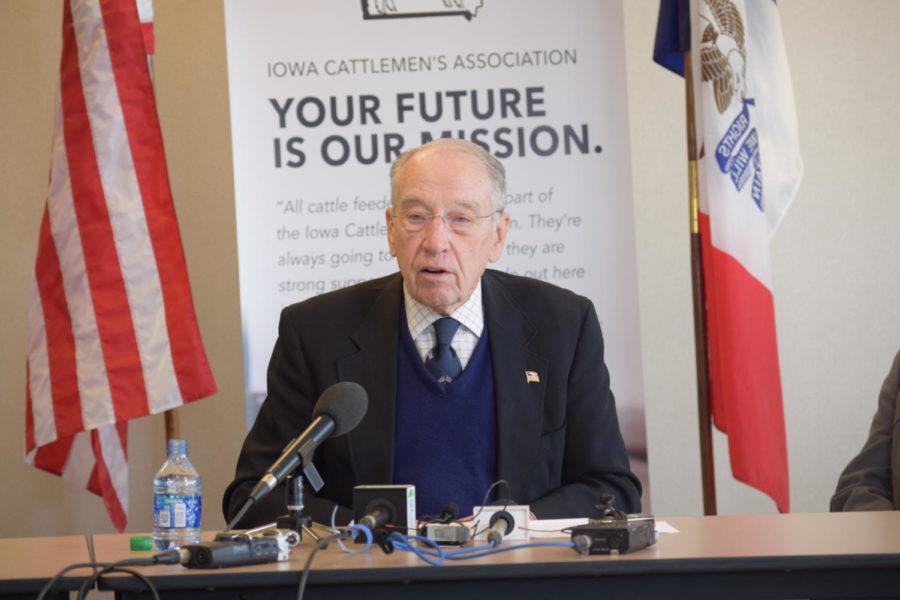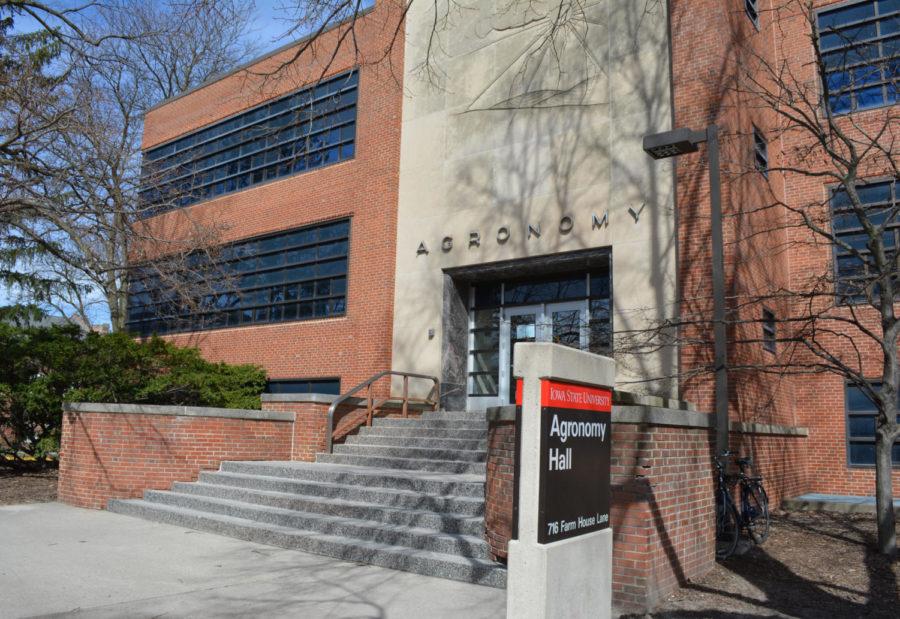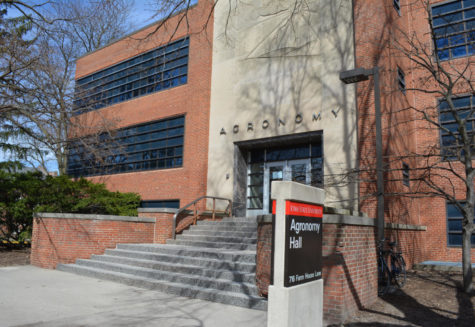Iowans anticipate Grassley to grasp eighth term
Iowa’s senior Republican Sen. Chuck Grassley at the Iowa Cattle Industry Headquarters in Ames, Iowa.
December 6, 2021
U.S. Sen. Charles Grassley (R-IA) announced his 2022 re-election campaign with lower approval rating from voters than Iowa’s junior senator, but Iowa State political science Associate Teaching Professor Kelly Shaw still predicts him to topple Democratic opponents in the upcoming midterm.
A poll among Republican voters from the Des Moines Register showed Sen. Joni Ernst has 80 percent approval while Grassley’s is 71 percent. The poll also showed 14 percent of Democrats approve of Grassley’s work, while 9 percent approve of Ernst’s.
Grassley served as president pro tempore of the Senate from 2019 to 2021. If re-elected, Grassley would serve his eighth term in the Senate. Prior to serving in the Senate, Grassley was a member of the Iowa House.
In another poll from the Des Moines Register/Mediacom Iowa Poll, Grassley leads with 55 percent approval over former U.S. Rep. Abby Finkenauer with 37 percent among likely voters. Seven percent are unsure who they would vote for between the two, and 1 percent would reported they would not vote.
Justin Hollinrake, a junior in political science, said Grassley has positioned himself in a slightly more moderate stance which inherently cost him some of his base.
“I think the unfortunate reality is, with how polarized things are and how partisan politics are today, at the end of the day, I don’t think there is that much of a difference between him and Joni Ernst when it comes down to it,” Hollinrake said in regard to voter behavior and turnout.
Public opinion polls leave room for margin of error, but aside from that, there are votes Grassley has taken which sections of his base disapprove, according to Shaw.
Grassley primarily sponsors bills relating to health care, government operation and education, with 30 percent of his sponsored bills relating to crime and law enforcement. Recently, Grassley and Ernst voted against the continuing resolution (CR), known as the Further Extending Government Funding Act, which prevents a government shutdown. This bill passed 69-28 and provides supplemental appropriations to federal agencies through mid-February.
“There is a very conservative faction within the RNC and the Iowa Republican movers and shakers that were not real pleased with the fact that he supported the infrastructure bill, as a result that might have played a role as well,” Shaw said.
Grassley voted in favor of the infrastructure bill, while Ernst joined the majority of Republicans in opposing the bill. President of Turning Point USA at Iowa State and a Freshman majoring in pre-business Armaan Gupta said he generally opposes omnibus bills, which are bills addressing a number of diverse or unrelated issues. Gupta said the current bill doesn’t focus enough on hard infrastructure and is excessive spending.
Hollinrake said within the Republican coalition there are different levels of Republican moderates.
“It is like three categories, it is the ones actively criticizing it, there are the ones who aren’t participating but aren’t really criticizing it either and there are the ones who are completely on board,” Hollinrake said. “I would put Grassley in that middle camp.”
Currently, multiple Democrats are running for the seat, including Abby Finkenauer and Mike Franken. Shaw said in terms of the conservative coalition, Grassley errs more on the moderate side of the spectrum opposed to the Trump cleavage of the party.
“If you contrast his policies and his support for Trump versus Kim Reynolds, as our Republican governor, I think you would find he is much more middle of the road on most issues than the governor,” Shaw said.
Prior to this poll, 27 percent of voters said they would vote to reelect Grassley, while 64 percent said they would prefer to see “someone new.”
Gupta said he doesn’t necessarily align himself with a specific party, but instead considers himself a constitutionalist. Gupta said he wasn’t surprised to hear Grassley’s run for re-election, but he would have liked to see a younger face.
“My fear is that he is going to quit or drop or something will happen,” Gupta said. “At that point, Gov. Reynolds has the power to appoint someone to fill in for him, which I am not a fan of because I think the people should decide.”
Grassley is 88 years old and currently is the second in line for seniority serving senator after Sen. Patrick Leahy (D-VT). Sen. Dianne Feinstein (D-CA) is the oldest serving senator, who is also 88. Hollinrake said when serving in office at older ages, public officials need to rely greatly on their staff to fulfill their duties.
Grassley’s incumbent advantage includes name recognition and a stocked war chest. Polarizing issues at the Supreme Court, such as the Mississippi abortion law which bans abortions at 15 weeks, could mobilize the liberal base, Shaw said. In 2020, the U.S. Senate race between Ernst and Democratic challenger Theresa Greenfield set a record of $234 million spent.
“It probably is not one of those seats that Democrats are going to put a lot of resources into and behind,” Shaw said. “So whomever is running against Sen. Grassley will start out with a significant disadvantage in terms of funding and name recognition. I don’t see the party getting behind somebody real solidly because it is probably not a flippable seat ultimately.”
Shaw said Iowa tends to be a purple state and Grassley has learned how to walk the partisan line with blue voters.
“He has been re-elected time and time again because of the fact that he does keep his ear to the ground and the 99 county tour is something he really started,” Shaw said. “In Iowa it is small enough that it has grass root politics and retail politics and he places that game really well.”

















